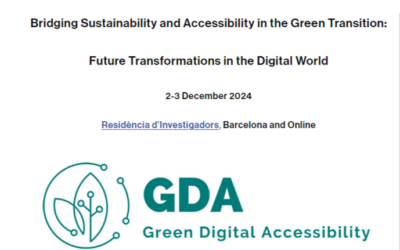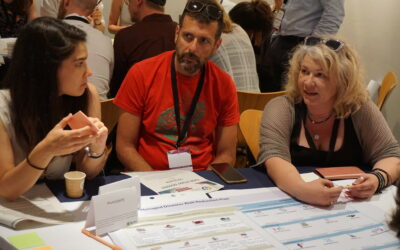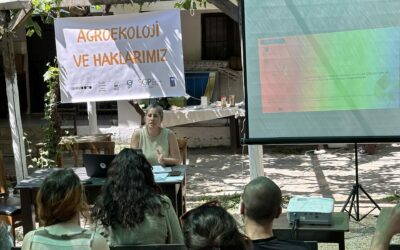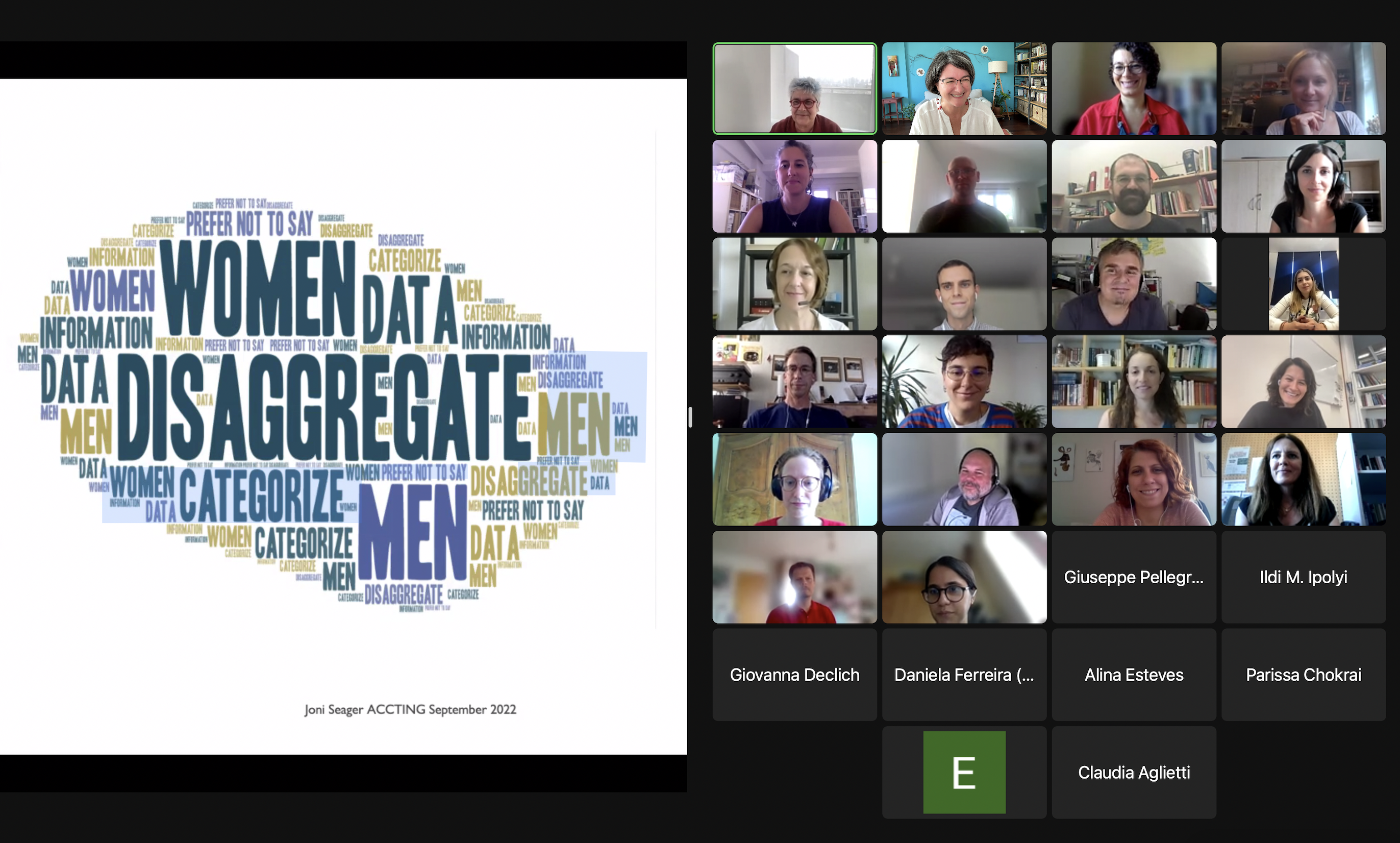
Key Takeaways:
-
- The ACCTING project takes an innovative gender+ perspective within its research methodology. ACCTING partners and other guests therefore met to listen to Professor Joni Seager´s introduction to Feminist Methodologies, and discussed how to implement this approach in our own practices.
- Environmental research can do much more in terms of gender analysis, and a gender+ perspective would be very helpful. See the text for the three main ways Professor Seager highlighted that researchers fail to examine gender in their research.
- Seager’s inspiring, engaging, mind-opening presentation on feminist methodologies left us with many beautiful questions and curiosities.
Where are the women and where is gender in our research methodologies? A gender+ perspective asks these questions acknowledging that gender is mutually shaped by multiple inequality grounds. How can we better integrate such a perspective into our exploration of social inequalities in the context of the climate crisis and the Green Deal? What can we learn from existing feminist methodologies about asking better questions, designing more robust methods, and refining our data analysis? To seek answers to these questions, Sofia Strid and Ayşe Gül Altınay invited Professor Joni Seager to deliver ACCTING´s first seminar, entitled “Feminist Methodologies” on September 9, 2022. The author of the renowned The Women’s Atlas and the lead author of Global Gender Environmental Outlook (2016), the UN Environment Programme’s first gender-based ‘State of the Global Environment’ report, Joni Seager has been a pioneering researcher and thinker in feminist environmental research.
This is a brief note on the major takeaways from this inspiring seminar which included a wealth of information and insight on using feminist methodologies to enhance gender+ analysis in environmental research and beyond.
The seminar started with Professor Ayşe Gül Altınay´s introductory talk on the importance of “feminist curiosity” (Cynthia Enloe) for better research. Altınay gave two striking examples of how the simple question “where are the women?” has revolutionized our understanding of history. Her first example came from anthropology, which, until the late 1960s, identified the longest period of human history as the “hunting period,” and, as exemplified in the prominent 1968 edited volume, Man the Hunter, identified hunters and “the human” as male. It was only when anthropologists grew more curious about women’s role in these societies that the central role of gathering for subsistence was recognised, ultimately leading to the formulation of “hunters and gatherers.” Hence, the simple question, “Where are the women?,” led to a revolutionary change in our understanding of the longest period of human history. Yet, according to Altınay, this is also a case that shows the limitations of this question, when it is not accompanied by a critical gender+ lens. The widespread binary understanding of men as hunters and women as gatherers has recently been challenged by empirical evidence coming from burial sites of hunters in the Americas. Archeology and anthropology professor Randall Haas and his colleagues, after unearthing the ancient burial site of a female hunter in the Andean highlands, have made the compelling argument that at least one third of hunters in the Americas may have been female. “It is time,” Altınay argued, “that we extend our imagination beyond the essentialist, binary framework of man-the-hunter and woman-the-gatherer, to be curious about women hunters, men gatherers, as well as non-binary gender regimes.” In her second example, bringing feminist curiosity ‘home’, Altınay recounted how she has only recently come to learn about the vibrant Ottoman feminist movement and the women´s university of 1914, which was established after a successful campaign launched by a feminist association. Canonical historicizations of modern Turkish feminism, of academia and of the Turkish Republic are radically challenged by these revelations, Altınay suggested.
After this introduction and invitation to ask “Where are the women?” and “Where is gender?” in our analysis, Professor Joni Seager took the floor and underlined that the gender+ perspective in environmental research has a lot of room for growth. Her feminist methodology model identified three dimensions where gender can be centralised: 1) Data, 2) Questions, and 3) Interviews.
Collecting and analysing gender data is not as straightforward or common as one might think, Seager reminded us. First of all, some researchers still do not consider gender as a valid category of social life and omit it altogether from their research design. Other researchers collect gender data but never present or make available the gender-disaggregated results. Some recently published articles, analysed at length by Seager, exemplify this: Even though their gender data calls for further analysis, the researchers have failed to process them because they included gender data superficially with no analysıs of how gender impacts differences in results. Hence, the researchers miss the opportunity not only to further develop gender+ knowledge, but also to contribute to an existing, more significant body of knowledge, Seager argued.
For Seager, there are three main ways in which researchers ignore gender in environmental analysis: first by not collecting disaggregated data, second by “hiding in the data” by collecting but not analysing disaggregated data, and third by “hiding in the household.” Seager’s discussion of the nonexistence of the “household” as a single unit of analysis was one of the most memorable moments of the seminar. As a persistent unit of analysis that hides the ways in which gendered dynamics of power find expression, the household is typically construed as a unitary entity. Yet feminist methodology invites us to “lift the roof over the household” and use the household as a field site that provides a range of gender data. Seager argued, “households do not have education rates, literacy rates, energy consumption or water usage. There can be radical differences within households, particularly on the basis of gender. The myth of the monolithic household has long been debunked.” For example, one research project cited by Professor Seager concluded that 44% of households in Samangan (Afghanistan) have a working radio set. When analyzed from a gender+ perspective, it was found out that, only 12% of the women had access to the radio. Hence, the “household” data of 44% was hiding a major gender difference in terms of actual access. Missing the gender+ dimension in such a case has serious outcomes, Seager argued, including not engaging in an effort to make radios available to women, which in turn makes them less capable of making informed decisions and, hence, more vulnerable, e.g., when it comes to taking timely action during a crisis or disaster. A similar case is the gender gap in access to mobile phones, which, again, makes women more vulnerable in disaster situations. When researchers and policymakers assume that “everyone has a cell phone,” this potentially fatal gap is missed. Gender is prevalent in how women and men assess and respond to human-wildlife conflict and its strategic management, as one of Professor Seager´s latest research documents. Hence, not collecting gender-disaggregated data or leaving it unprocessed and unanalysed, Professor Seager continued, is an unfortunate way of “squandering our resources and limiting our understanding of what’s happening on the ground.”
As Professor Altınay reminded us, asking feminist curious questions is one of the key aspects of feminist methodology. Professor Seager expanded on the importance of feminist questions, especially in environmental research, where assumptions of socially neutral contexts are still dominant. For example, instead of asking neutral-looking questions such as whether “food insecurity is greater/lesser/about the same as ten years ago,” Professor Seager invited us to rephrase the question with a gender+ lens. One way would be to pose “who” questions for every setting: Who in the family is the most responsible for managing food?; Who makes the decisions about resources?; Who decides what crops to plant?; Who does the planting?; Who usually makes the financial decisions with the income, etc. In the words of Joni Seager, “Most environmental literature has zero gender curiosity.” An intersectional feminist lens enables researchers to explore a set of gender+ data as it intersects with social, cultural, and political dynamics, such as gendered power dynamics, divisions of labor, values attached to farm work, and so on. During the discussion, one of the seminar participants reflected on the traditional tendency to perceive topics such as disasters, biodiversity, and transportation in environmental research as gender-neutral, and the importance of unsettling these perceptions.
The final part of Professor Seager´s discussion focused on feminist interviewing. Even though social science researchers have become more attentive to the importance of rapport, Seager argued, there is less clarity on how to create it. This part of the seminar provided a lot of practical wisdom such as holding same-sex interviews, encouraging the research participants to ask questions and reciprocal sharing of information (both personal and about the study). Professor Seager suggested that the interview relationship should go beyond a data grab-and-go and instead be a genuine encounter between two (or more) individuals focused on a common topic. Reminding us that “Qualitative research is emotional labour,” Professor Seager underlined that, once we are aware of this, interviewing can be a very powerful experience and knowledge production method.
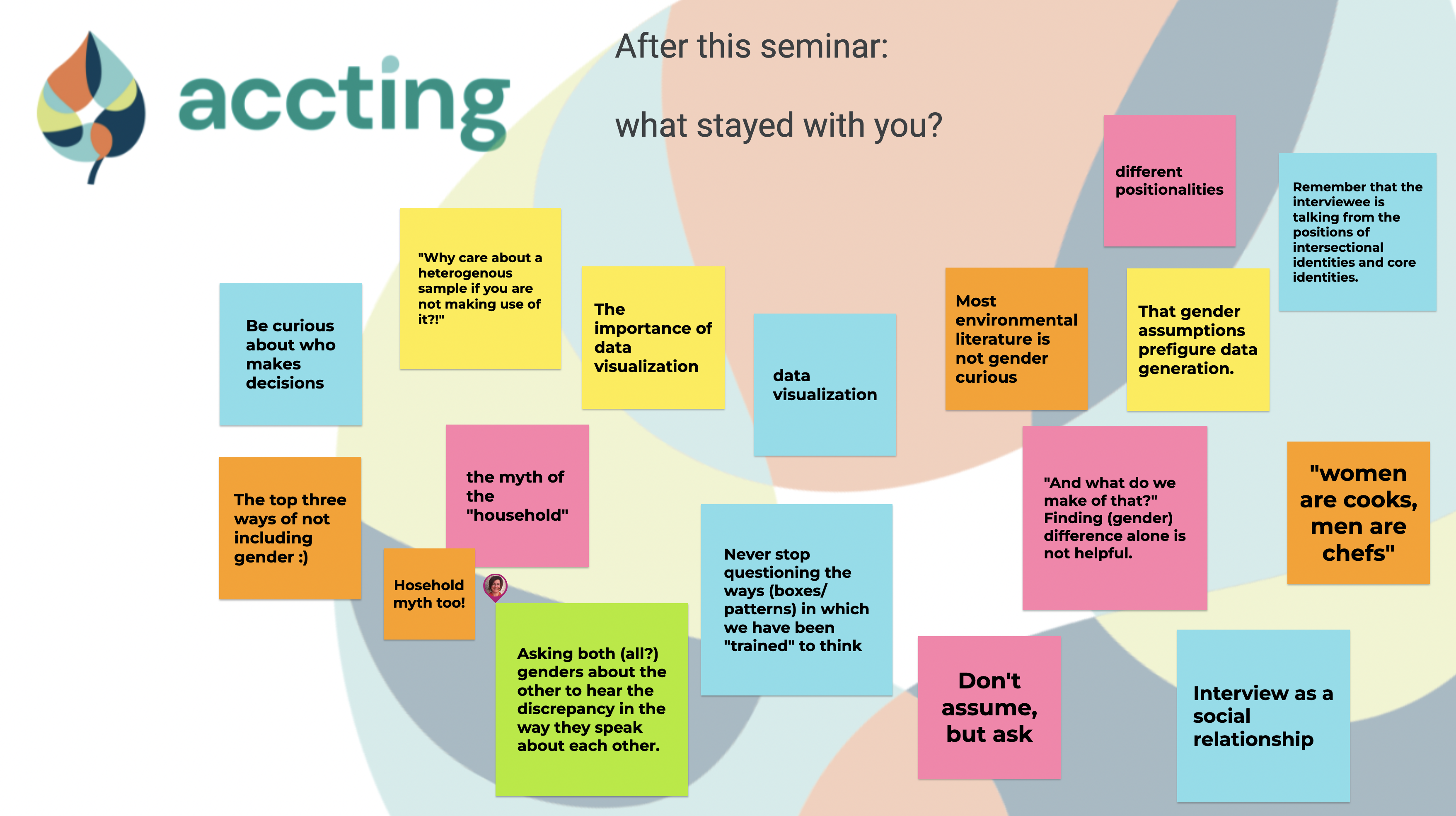
During the discussion, a few striking examples were given by Joni Seager and the ACCTING participants regarding research on “cars” typically being gender-neutral or gender-blind, and missing key data on significantly gendered aspects of car use and mobility, with considerable environmental and social consequence. Another significant point of discussion was regarding citation practices: Whom do we cite? Whose research do we take seriously? Where is the feminist literature on environmental research in our bibliographies, and in our analysis?
Professor Joni Seager’s inspiring, engaging, mind-opening presentation on feminist methodologies left us with many beautiful questions and curiosities. ACCTING is a project with innovative and critical potential for environmental research, starting with its focus on gender+ analysis. We very much hope that this lively and energizing encounter will help us explore the “better story” (Dina Georgis) of doing research on the Green Deal’s potentials, limitations and challenges from a critical and generative feminist perspective.
About the authors
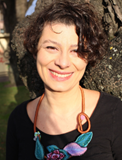
Dr. Esin Düzel is a Project Specialist for the EU Horizon 2020 project ACCTING, at Sabancı University´s Gender and Women´s Studies Excellence Center, and an anthropologist with a PhD from University of California, San Diego. Her work is concerned with affect, morality, and body in wars and conflicts, feminist and everyday peace, and future studies (with a focus on utopias, disasters, and biodiversity). She lives in Helsinki, Finland.
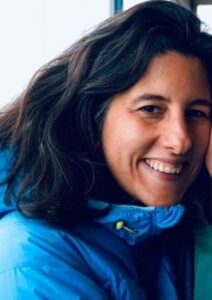
Burcu Borhan Türeli is a Project Specialist for the ACCTING project and works at Sabancı University´s Gender and Women´s Studies Excellence Center. She has worked at various national and international universities. Her research interests include juvenile literature, alternative forms of schooling, rural gender transformation, agri-food relationships, food security and values. She lives in Çanakkale, Turkey.

